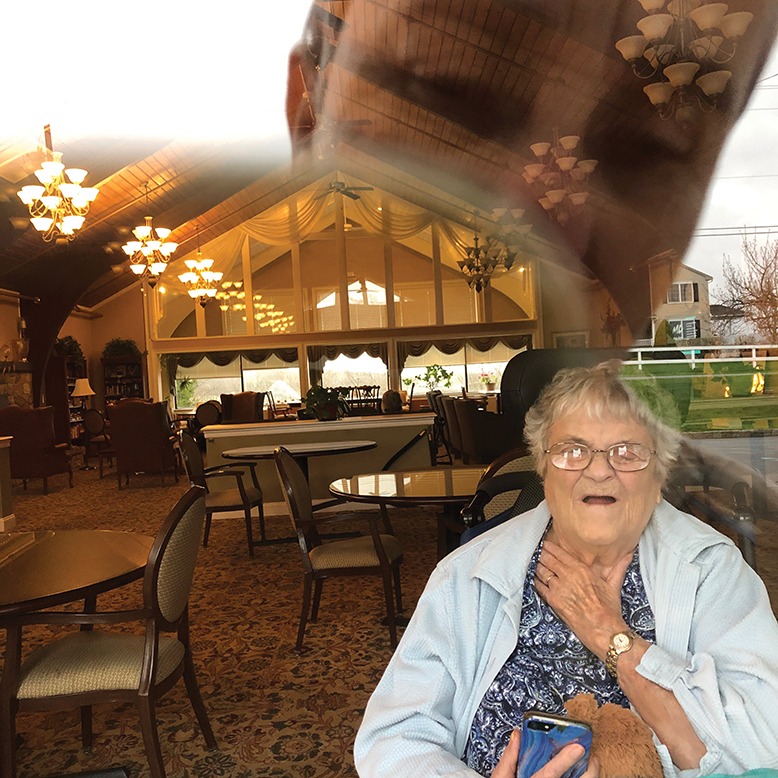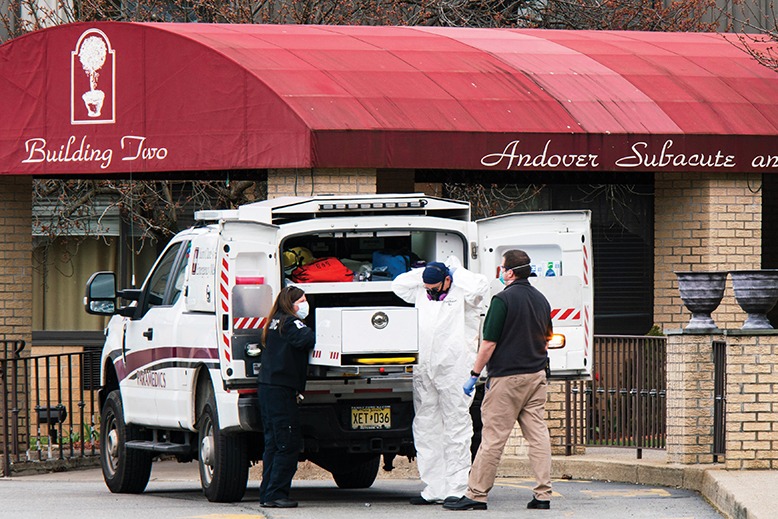
Jennifer Harold’s reflection appears in the window that divides her from her mother, Sheila, 93, during visits to Bentley Assisted Living. The Branchville eldercare facility is one of the few in the state untouched by Covid-19. Courtesy of Jennifer Harold
Imagine you’re going to visit Grandma at her nursing home. As you approach the visitors’ entrance, a thermal camera scans the temperature of everyone in your family. Luckily, you’re all fine. If anyone had a fever, the door would automatically lock.
Once inside, you notice an employee collecting a saliva sample from a nurse’s aide. Another worker is leaving, looking dejected; it turns out she has a second job at another long-term care facility that has a flare-up of Covid-19 cases. For that reason alone, she’s banned from working here for the time being.
Just as the 9/11 attacks changed the way we move around airport terminals, the Covid-19 pandemic has put an end to casual access to nursing homes, experts predict.
It was expected—even predicted—that the novel coronavirus would harvest many of its victims from the frail and elderly. In fact, it was inevitable the virus would find its way into nursing homes, says Laurie Facciarossa Brewer, the state’s long-term care ombudsman. “What wasn’t inevitable,” she says, “was the scope of the infection, and the number of deaths.”

Staff at Andover Subacute and Rehabilitation Center prepare to transport a deceased resident after Covid-19 swept through the Sussex County facility. An overnight inspection on Easter weekend revealed 17 bodies in a makeshift morgue. Photo: Eduardo Munoz Alvarez/Getty Images
The extent of the tragedy has been well-documented. In Sussex County, the Andover Subacute and Rehabilitation Center catapulted into the headlines when local authorities discovered the disease’s rampage outpaced the 697-bed facility’s ability to deal with the corpses. Their overnight inspection Easter weekend revealed 17 bodies stored in a makeshift morgue. As of May 4, there were at least 67 reported deaths at the facility, according to the New Jersey Department of Health.
In Bergen County, the death toll hit 80 at the New Jersey Veterans Home in Paramus, where workers complained they were told to avoid using face masks because it would scare the residents. The administrator there later resigned.
At least three-quarters of the more than 600 facilities where the elderly live in a group setting eventually reported at least one Covid-19 case. To date, deaths in such facilities account for nearly half of the state’s total. These facilities are licensed by the state Department of Health and are subject to surprise inspections nearly annually that last three to four days. In addition, a facility can be visited by the ombudsman’s staff in response to a complaint.
Nursing homes and assisted-living centers can’t be hermetically sealed like some futuristic biodome. Staffers come and go, vendors make deliveries, relatives and friends drop by for a visit. In the pandemic, all posed a risk to the residents inside.
[RELATED: How Jersey Scientists Are Racing to Strike Down Covid-19]
“The virus didn’t come in on an airplane. It came in [from a person], whether from a worker or a family member,” says state Senator Joe Vitale (D-Middlesex). Vitale, chairman of the Health, Human Services and Senior Citizens committee, authored a bill signed into law last summer mandating that long-term care facilities have a response plan for outbreaks.
Some of the facilities posting the most deaths had shaky safety records before the pandemic, as indicated by nursing home data at medicare.gov. Andover Subacute and Rehabilitation Center had a one-star rating from Medicare.
“They were giving out masks to everyone when this first all started, then they stopped handing them out,” a nursing-care specialist told New Jersey Monthly in an email exchange. The woman, who preferred to remain anonymous, works at the Andover facility on an as-needed basis. She and others resorted to bringing their own N95 masks from home. On her shifts, she saw some staff using no personal protection equipment (PPE) at all, while others were appropriately wearing masks, gloves and hair coverings.
Yet to assume such weaknesses alone explain the deaths in congregate care misses the point: Covid-19 could bring even a respected, five-star facility to its knees.
* * *
The distress signal from the Catholic order operating St. Joseph’s Home for Seniors in Woodbridge came in mid-March, when staff illnesses and quarantines left all the care to just three nuns. The state swept in to evacuate the residents, with six buses taking them to a facility in Morris County.
Vitale remembers a conversation he had with Judith Persichilli, the state’s health commissioner, who began her long career in health administration as a nurse.
“She said, ‘Joe, if I can’t get staff people up there, I will put on a gown and go up there myself,’” he recalls. “And she would’ve.”
The day St. Joseph’s was evacuated, Fran Groesbeck’s sick mother was the only resident transported to a hospital. At one point during her 32-day stay at the hospital—Raritan Bay Medical Center in Perth Amboy—her family was told she probably wasn’t going to make it. In a FaceTime call, they asked for her final wish. Her immediate response: “That St. Joseph’s can reopen.”
Out of gratitude for the care their mother received at St. Joseph’s, the family set up a GoFundMe page for the home. “The love these sisters show, it’s unconditional,” Groesbeck says. “Their responsiveness was incredible.” (Luckily, Groesbeck’s mother survived.)
Despite their best efforts, the virus, with its diabolical ability to use asymptomatic individuals to infect others, exposed a key gap in the fortifications against it: Staffing. All the masks in the world won’t help if you don’t have enough workers.
What lessons have been learned to counter that? What innovations worked?
[RELATED: CASA Volunteers Adjust to Covid-19 Constraints]
At the virus’s peak in Bergen County, the Actors Fund Home in Englewood had nearly a third of its staff either out sick or quarantined for exposure. Administrator Jordan Strohl’s solution was to throw money at the problem.
Healthy employees were offered a $50-a-day bonus just for coming to work. Pull a second shift? That’s another bonus. Choose to work in one of the “hot zones” set up for Covid-19 patients? See even more money in your paycheck.
Actors Fund Home employees who couldn’t come to work because schools were closed and they had kids at home were reimbursed up to $100 a day for childcare. Those who feared using public transportation were reimbursed for Uber expenses.
“I told my board, ‘Now’s not the time to worry about money,’” Strohl says.
Staffing shortages and low pay have long plagued the industry. The issues were made worse, paradoxically, by the robust pre-pandemic economy and recent increases in the minimum wage. The average certified nurse’s aide makes $15 an hour, according to Brewer, the ombudsman.
“If you can work at Target or you can work in a nursing home, which are you going to pick?” Strohl asks.
* * *
The inevitable Covid-19 postmortems will likely feature a repeat of the tug-of-war in which owners of long-term care facilities claim Medicaid payments are too low to fund quality care, and the government says it simply can’t pay more.
Vitale, for one, is fed up with that dance. “I’m tired of hearing, ‘If only the reimbursement were better. We can’t hire people.’ You’re paid to protect these people. That’s your job,” he says. “There’s no excuse for managing their care so poorly.”
[Update: As the virus continued to spread through facilities, killing one out of every 13 residents as well as 107 staffers statewide, Governor Phil Murphy announced the state had hired outside consultants to figure out what went wrong and what needs to change.]
Brewer as well feels the pandemic raised the need for urgent reforms. Facilities should have warehouses full of PPE— “boatloads of the stuff, more than you think you’ll ever need.” The state needs better tools to root out bad apples from acquiring for-profit homes. “Every facility should have a registered nurse, who is certified in infection control, whose only job is to oversee infection processes,” says Brewer. And “testing, testing, testing” of every staff.
Most importantly, any increase in government funding should be tied to proof the extra money is going straight to pay increases that would attract more workers, Brewer says, and not to the bottom line.
“Out of every challenge comes an opportunity,” she says. “And I just hope this opportunity isn’t squandered.”
